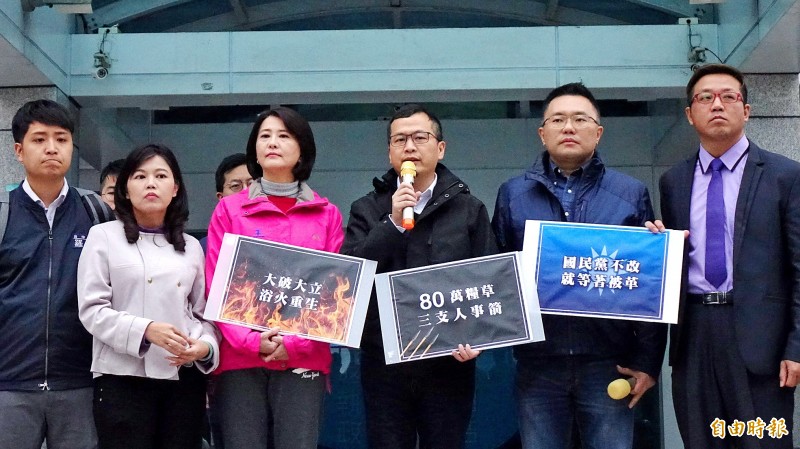《TAIPEI TIMES》 KMT urged to undertake reforms

Members of the Chinese Nationalist Party (KMT) youth wing hold a news conference in Taipei yesterday. Photo: Fang Pin-chao, Taipei Times
OUTDATED STANCE: If the KMT fails to reform, it might end up being replaced by other parties, a youth wing director said, calling for a new cross-strait discourse
By Ann Maxon / Staff reporter
Several Chinese Nationalist Party (KMT) members have called on the party to review its cross-strait policy and recruit more young people following its trouncing in Saturday’s presidential and legislative elections.
It was the second consecutive presidential election that the KMT has lost to the Democratic Progressive Party (DPP) since 2016, and fourth since the first direct presidential election in 1996.
The KMT also failed to secure a legislative majority in Saturday’s polls.
The election results show that “the KMT could end up being replaced by other parties if it does not undertake reforms,” KMT Organizational Development Committee Youth Department Director Hsiao Ching-yan (蕭敬嚴) wrote on Facebook.
Attributing the party’s losses to its outdated cross-strait policy and leadership, Hsaio urged it to propose “a new cross-strait discourse that meets the expectation of a majority of Taiwanese.”
The “1992 consensus” is no longer relevant and has been rejected by the public in the elections, he said.
The party must appoint young people to important positions and adopt more ideas from the younger generation, he added.
KMT Taipei City Councilor Yu Shu-hui (游淑慧) also urged the party to rethink its cross-strait stance.
Cross-strait policy was a key issue in the presidential election and as Taiwanese have made their choice, “the KMT should respect the DPP’s way of handling cross-strait relations,” she wrote on Facebook.
The KMT should also reconsider the “1992 consensus,” proposed 28 years ago, she said, adding: “If you are wearing a piece of clothing that is out of date and does not fit you, then it is time for you to review it or look for a replacement.”
While many older KMT members seem to agree that the party needs to recruit more young people, they appeared reserved about other proposals.
One of the reasons behind the electoral defeats was the party’s poorly planned presidential primary, which upset some candidates and affected party solidarity, former KMT chairwoman Hung Hsiu-chu (洪秀柱) said.
As KMT chairman, Wu Den-yih (吳敦義) must shoulder the responsibility, she said, adding: “We really have to pass the baton to the younger generation.”
The party must continue to build its brand, explain its core beliefs and foster more young talent, she said.
However, due to its historical significance, “the name of the Chinese Nationalist Party must never change,” she added.
More than 20 KMT members — including Yu, Taipei city councilors Lo Chih-chiang (羅智強), Wang Hung-wei (王鴻薇), KMT Legislator Jason Hsu (許毓仁) and Kaohsiung Mayor Han Kuo-yu (韓國瑜) election campaign spokespeople Huang Man-hsin (黃曼昕) and Yeh Yuan-chih (葉元之) — yesterday formed an alliance called “+1” to push for across-the-board reforms within the party.
The alliance demanded that Wu immediately resign his post as chairman, instead of waiting for the KMT Central Standing Committee’s approval on Wednesday, and that he and retired lieutenant general Wu Sz-huai (吳斯懷) withdraw their names from the party’s list of legislator-at-large nominees.
Wu Sz-huai’s nomination has played a part in the KMT’s defeat in the legislative elections, KMT Taipei City Councilor Chang Shi-gang (張斯綱) said.
The so-called “1992 consensus” refers to a tacit understanding between the KMT and Beijing that both sides of the Taiwan Strait acknowledge there is “one China,” with each side having its own interpretation of what “China” means. Former Mainland Affairs Council chairman Su Chi (蘇起) in 2006 admitted that he had made up the term in 2000.
新聞來源:TAIPEI TIMES












